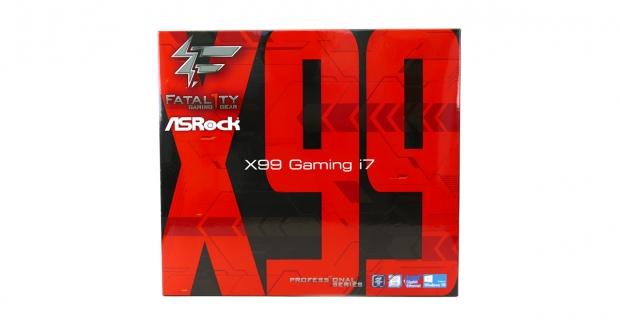The Bottom Line
Introduction, Specifications, and Pricing
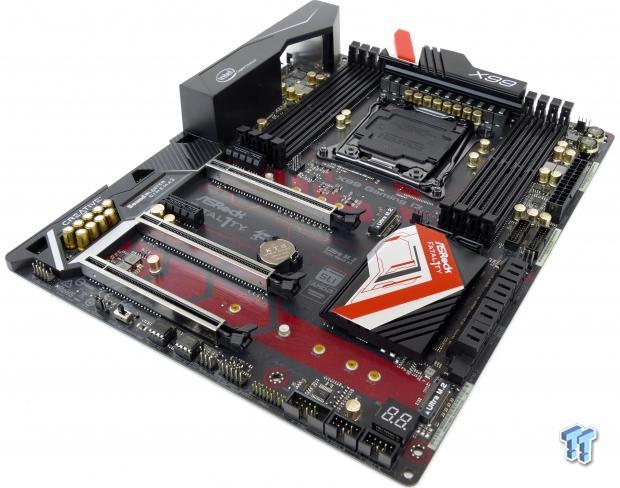
ASRock teased us with the X99 Taichi and the Fatal1ty X99 Professional Gaming i7 motherboards during a Broadwell-E launch event in Taiwan. If its ultra-long name had not made it clear, the Fatal1ty X99 Professional Gaming i7 is designed for Intel's i7 X99 CPUs. Rather than the white and black color theme of the X99 Taichi, the Fatal1ty X99 Professional Gaming i7 features a more mainstream red and black aesthetic. While most X99-refresh motherboards feature a U.2 port for Intel's NVM drive, it seems that ASRock decided to add a second Ultra M.2 slot instead since most of the latest drives come in the M.2 form factor.
Interestingly enough, ASRock has decided to opt out of implementing LEDs on its Fatal1ty X99 Professional Gaming i7, which might add some points for users who do not care for them. Instead of aiming for the extreme top regarding price and features, ASRock has decided to focus on the mid-range price bracket with its refresh motherboards. Priced very competitively, the Fatal1ty X99 Professional Gaming i7 is loaded with the latest in features and connectivity. Let's take a look at what ASRock is offering.
Specifications

The ASRock Fatal1ty X99 Professional Gaming i7 has many high-end features including two Ultra (32Gb/s) M.2 ports, USB 3.1, Wireless AC, Sound Blaster Cinema 3, and many platform features such as USB 3.0 and SATA6Gb/s.
Pricing
The Fatal1ty X99 Professional Gaming i7 is available from many large retailers for $253.99.
Packaging and Fatal1ty X99 Professional Gaming i7 Overview
Packaging and Overview
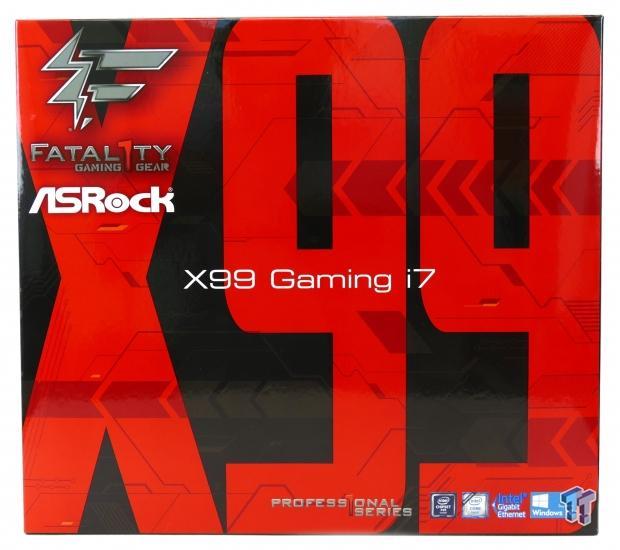
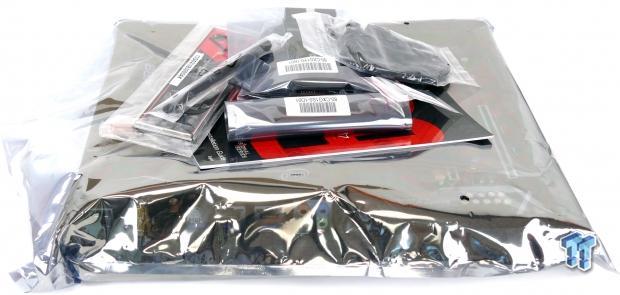
The Fatal1ty X99 Professional Gaming i7's box is much different than previous ASRock motherboard boxes. It produces a higher quality feeling compared to what I have seen from ASRock in the past. Packaging is well done, and the motherboard is well protected.
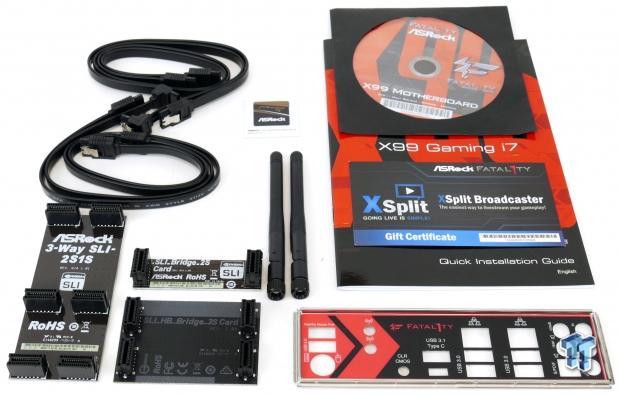
Accessories include a 2-way SLI bridge, 2-Way SLI High Bandwidth bridge, 3-way SLI bridge, two WIFI antennas, clear CMOS button, four SATA6Gb/s cables, IO shield, case badge, XSplit Broadcaster gift certificate, driver DVD, and user manual.
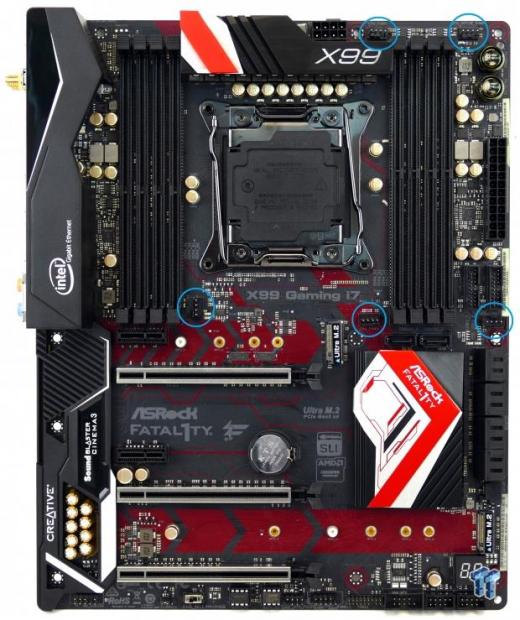
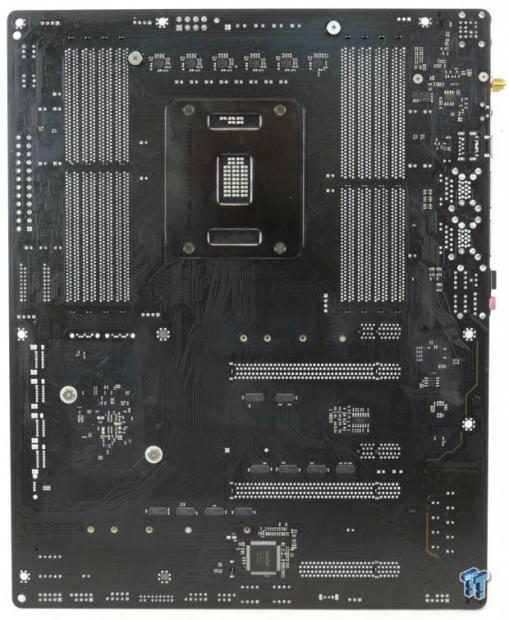
The ASRock Fatal1ty X99 Professional Gaming i7 has five four pin PWM fan headers. Two are located above the CPU socket and three below it. There are no headers along the bottom edge of the motherboard, which is an unusual design choice. The motherboard's color theme is not too bad, white, red, and black go together well in this case. I do not mind the Intel and Creative branding; I think some users will like this since those are two very strong brand names within the US, so it makes the product look more professional.
While the shield over the audio and IO section is plastic, most of the heat sinks are made of aluminum. There is a block of red plastic on the VRM heat sink, and it doesn't look so great up close, but from a distance, it looks okay. I like what ASRock has done with the PCB silkscreen, especially around the M.2 ports. You will notice that the back of the PCB isn't bare of components, ASRock has moved quick switches and some other PCB items to the rear to make the PCB look better.

The IO panel on the Fatal1ty X99 Professional Gaming i7 features two 1Gbit LAN ports, WIFI antenna ports, USB 3.1 type-C, USB 3.1 type-A, four USB 3.0 ports, two USB 2.0 ports (you should use these for OS installation), PS/2 keyboard/mouse, and 7.1 audio jacks with TOSLINK.
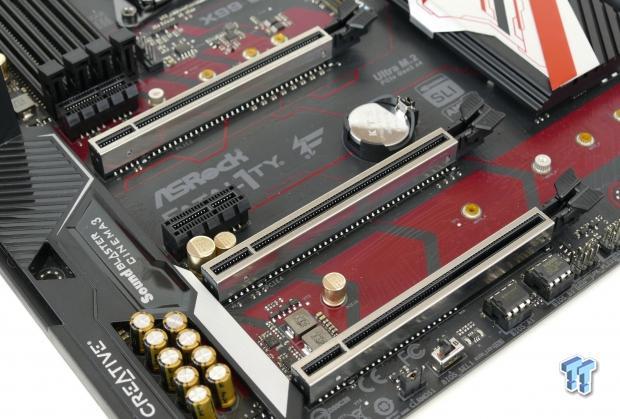
The Fatal1ty X99 Professional Gaming i7 features three PCI-E x16 slots. With a 40-lane CPU, they operate at x16/x16/x0 or x16/x8/x8 from the topmost to bottommost PCI-E slots. With a 28-lane CPU, you will have the slots operate at x16/x0/x8 or x8/x8/x8.
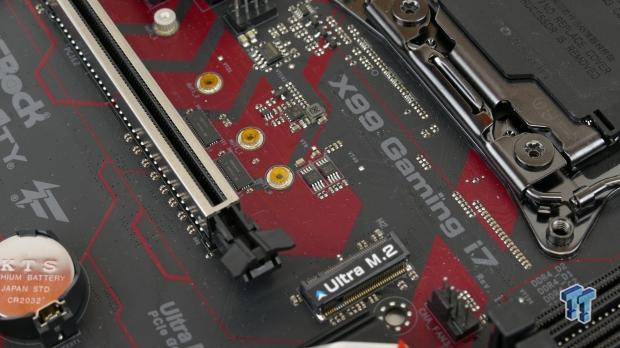
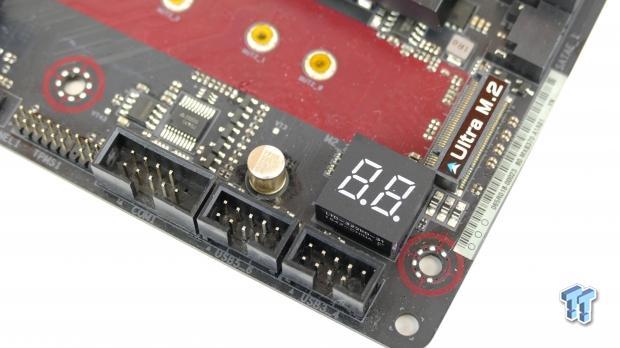
You might have noticed that the PCI-E slot lane count is a bit low for an X99 motherboard, and the reason for that is ASRock decided to give x8 of the CPU's PCI-E lanes to the two M.2 slots (x4 each). However, you only get two Ultra M.2 slots with a 40-lane CPU; a 28-lane CPU will only have one M.2 slot operating. Each M.2 slot does have a link to an SATA6Gb/s connection from the PCH, so both slots support SATA based M.2 devices. The motherboard also has two internal USB 2.0 headers, a COM port, and a POST code connector below the bottom M.2 slot.
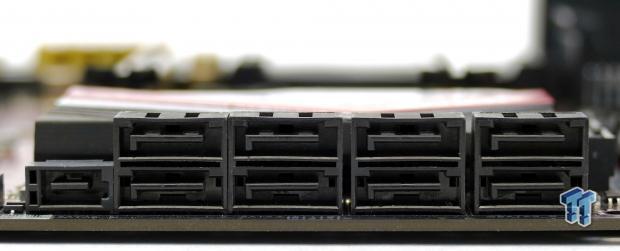
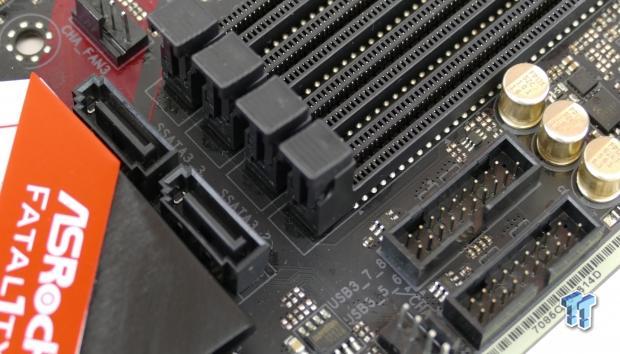
All ten of the SATA6Gb/s ports from the PCH are present, but only eight are right angled. There is even an SATA Express port. Two of the SATA ports are straight (below the memory DIMMs). The motherboard also has two USB 3.0 headers located side by side below the 24-pin connector.
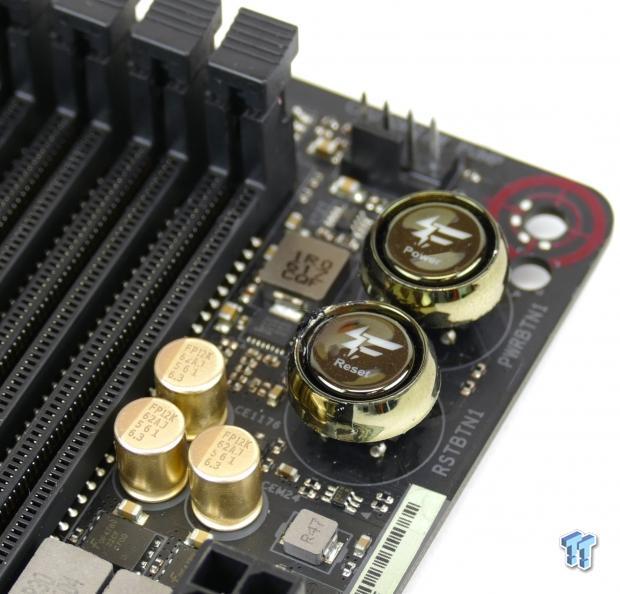
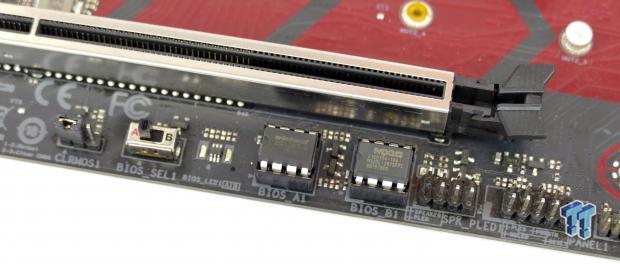
The motherboard has Power and Reset buttons in the top right corner. There are two BIOS ROMs in DIP sockets and a selector switch.
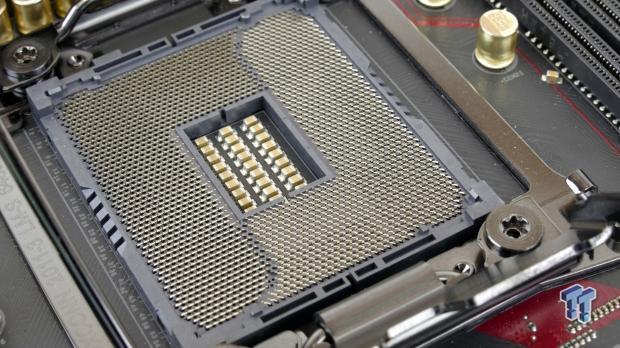
The CPU socket has extra pins in it to help unlock more overclocking potential in Haswell-E CPUs.
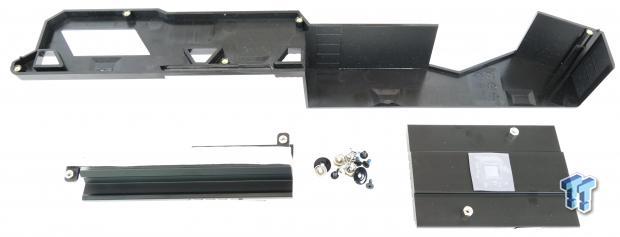
The heat sinks make great contact with the motherboard.
ASRock Fatal1ty X99 Professional Gaming i7 Circuit Analysis
Circuit Analysis
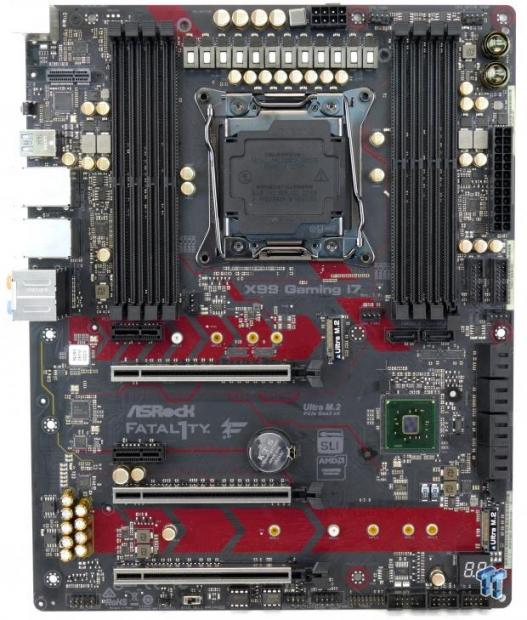
The PCB silkscreen is unique, and I like how ASRock has smoothened out most of the front facing PCB by moving many components to the rear of the PCB.
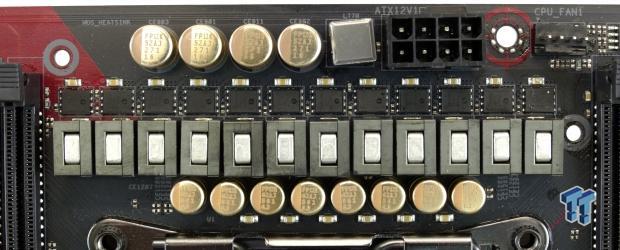
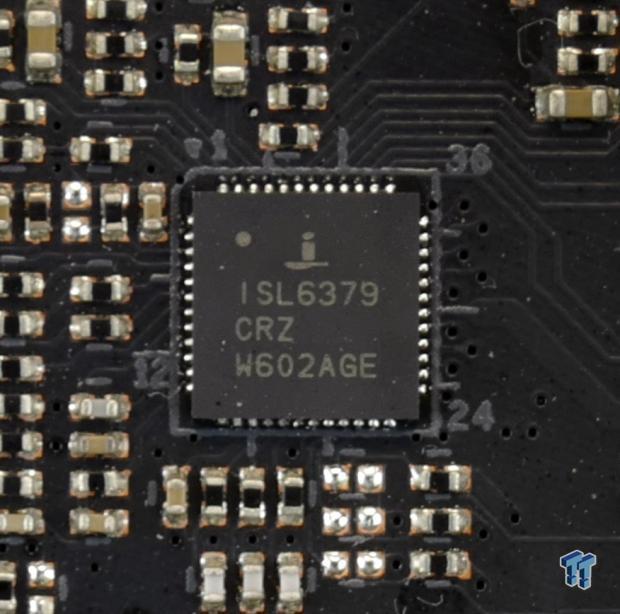
The main CPU VRM is made up of 12 phases. Each phase uses a 60A inductor, and the output capacitor bank contains ASRock's gold 12K capacitors. The PWM controller is an Intersil hybrid digital ISL6379 six phase model.
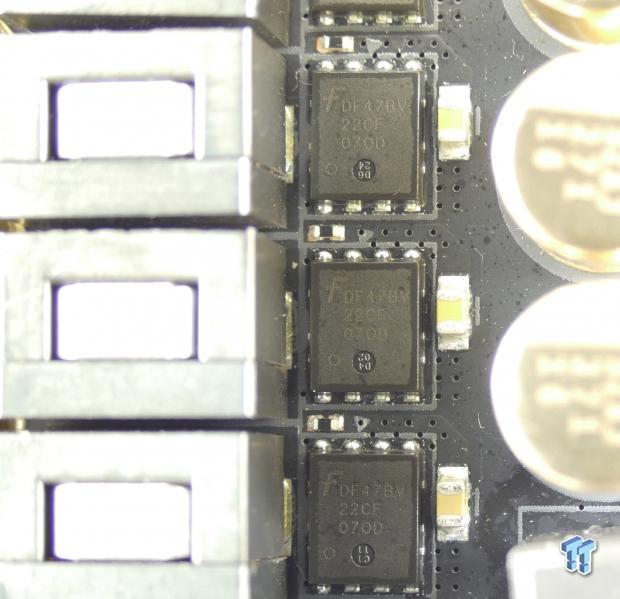
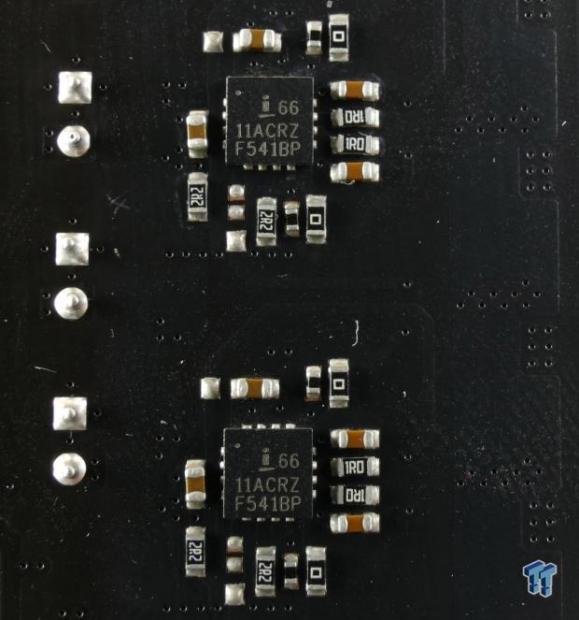
ASRock is using Fairchild Semiconductor FDMS3660S PowerTrench Power Stages that contain both the high-side and low-side MOSFETs. On the back of the PCB are six Intersil ISL6611A doubler/dual driver units that take the six PWM channels from the PWM controller and double them to twelve.
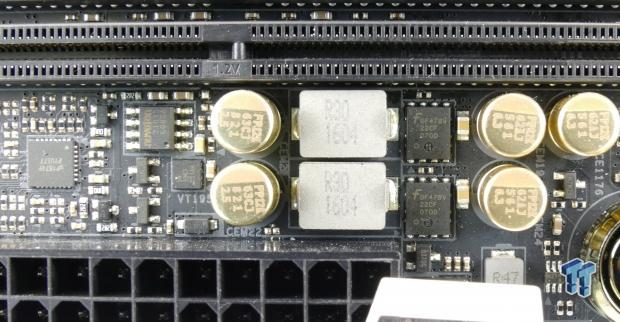
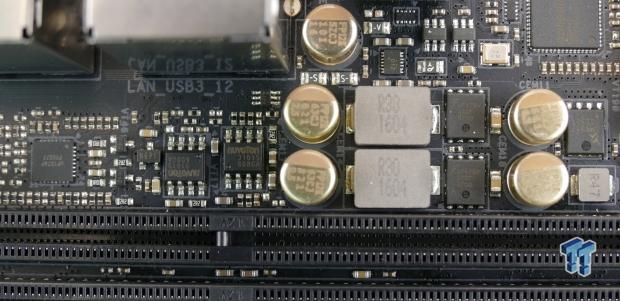
Each memory VRM uses a UPI UP1674P analog PWM, two Fairchild FDMS3660s, and a few 12K gold polymer capacitors.
ASRock Fatal1ty X99 Professional Gaming i7 Circuit Analysis Continued
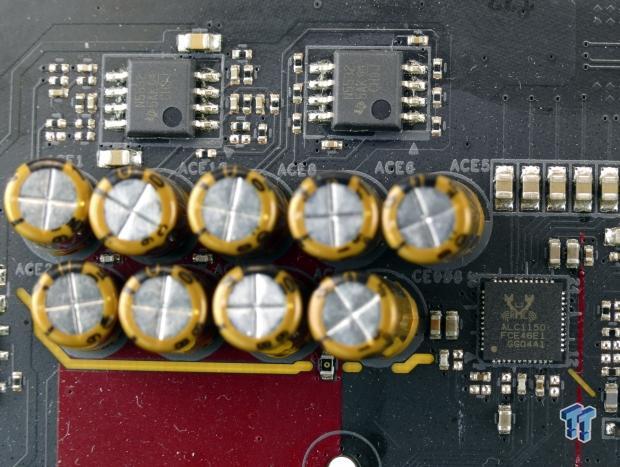
The Fatal1ty X99 Professional Gaming i7 uses a Realtek ALC1150 codec featuring a 115dB SNR. ASRock further upgraded the audio with two Texas Instruments NE5532 amplifiers, physical isolation, and Nichicon Gold Series capacitors.
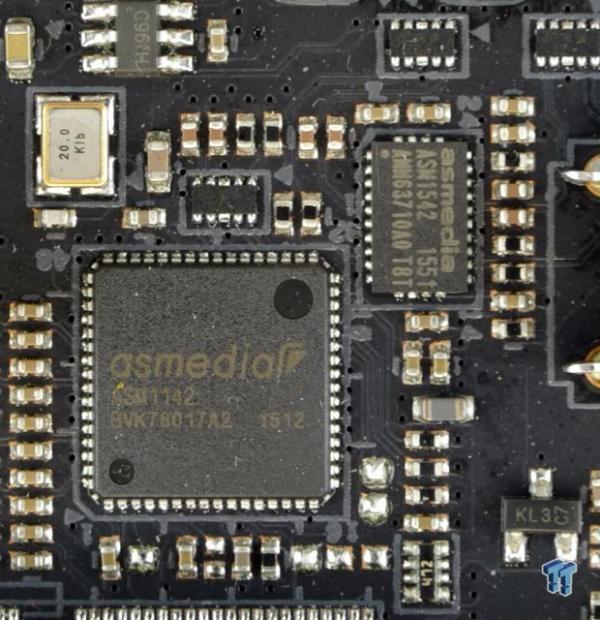
USB 3.1 comes from an ASMedia ASM1142, which uses an ASM1542 10Gb/s switch for the type-C port.
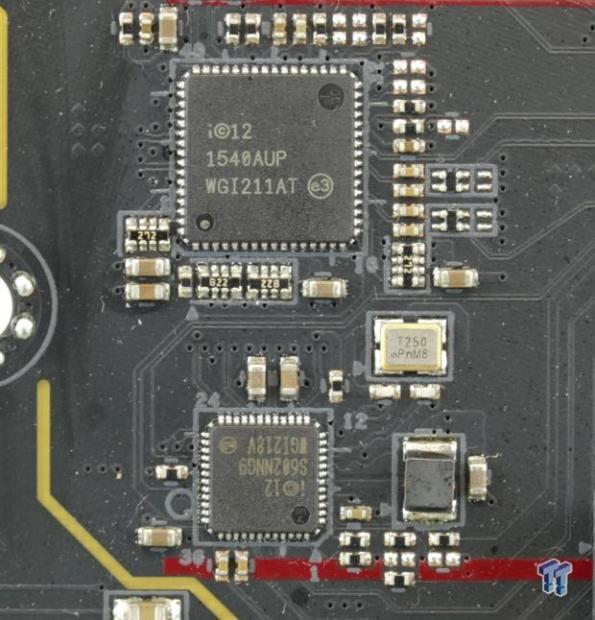
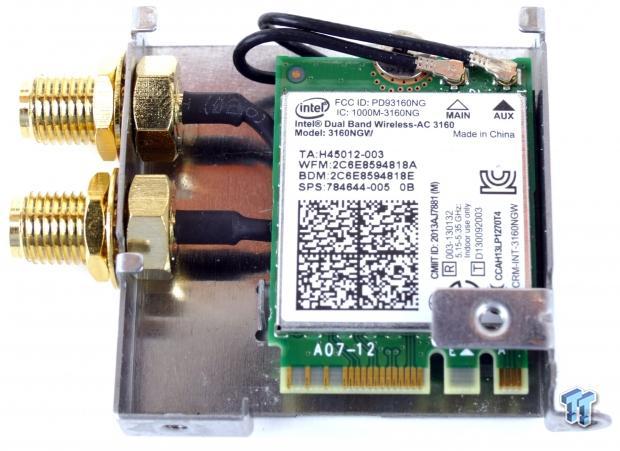
The Fatal1ty X99 Professional Gaming i7 features two 1Gbit Intel NICs. The i218v is a PHY for the integrated MAC in the PCH, and the i211AT is the second fully integrated NIC solution. The Wireless AC is from an AC 3160 card.
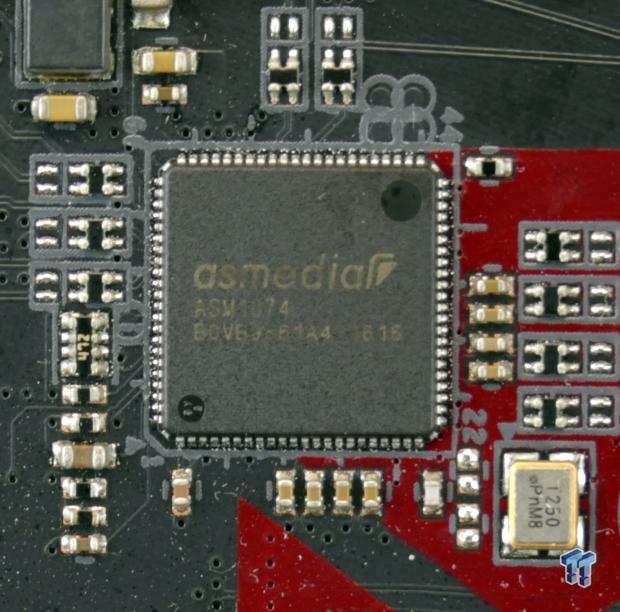
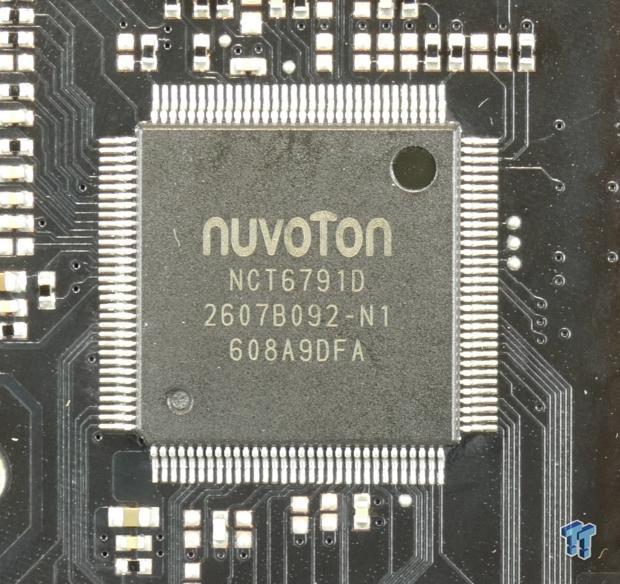
The ASMedia ASM1074 hub is used to supply all those USB 3.0 ports on the IO panel. A nuvoTon NCT6791D is the SuperIO that provides monitoring, fan control, and PS/2 on the rear IO.
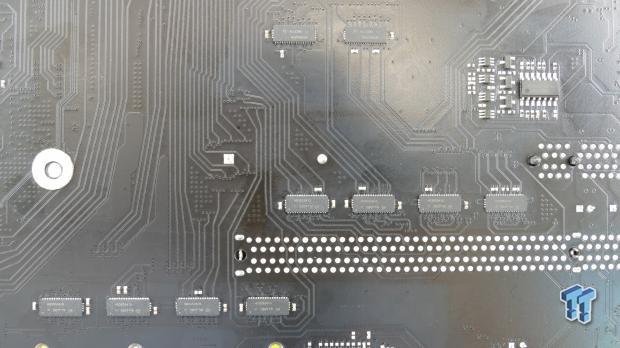
There are many PCI-E quick switches on the rear of the PCB used to switch the PCI-E lanes from the CPU.
BIOS and Software
BIOS
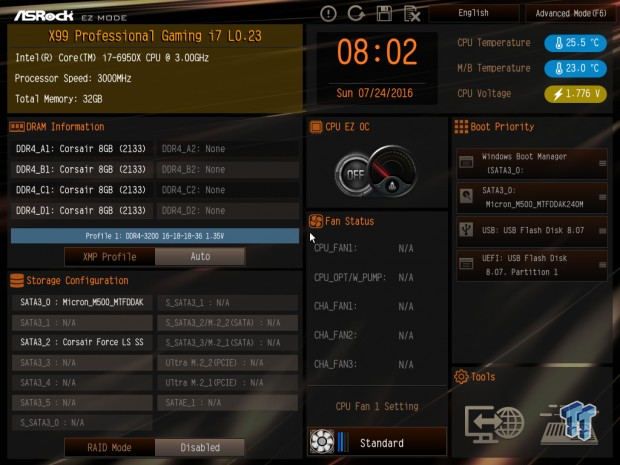
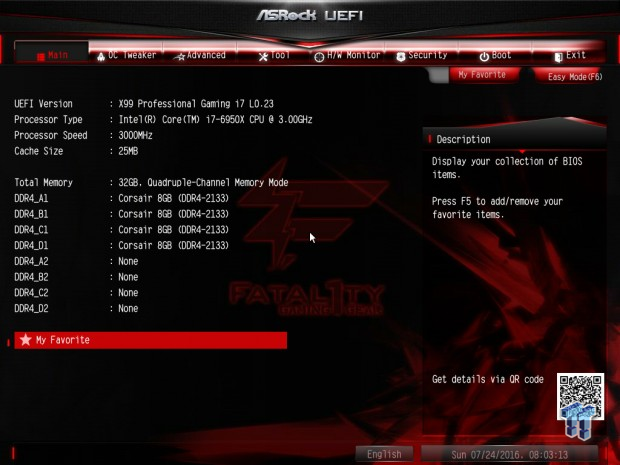
ASRock's UEFI on this motherboard is very similar to that of their previous motherboards. The UEFI has two operating modes; an Easy Mode for novice users and an Advanced Mode for more experienced system builders and overclockers. There are basic OC profiles for both the CPU and memory. All voltage and power controls are present to overclock Broadwell-E and Haswell-E CPUs. GUI and manual fan controls are present as well.
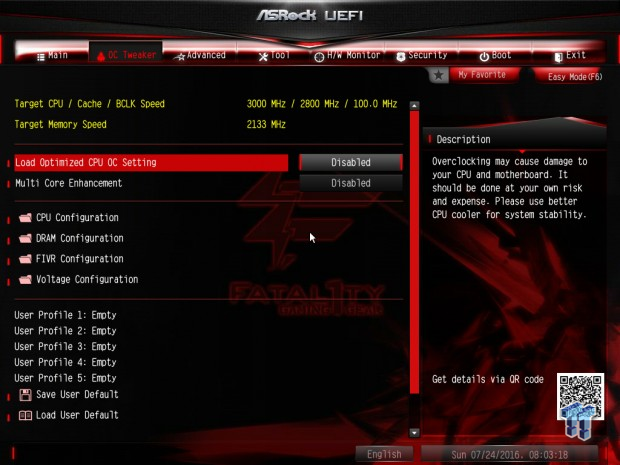
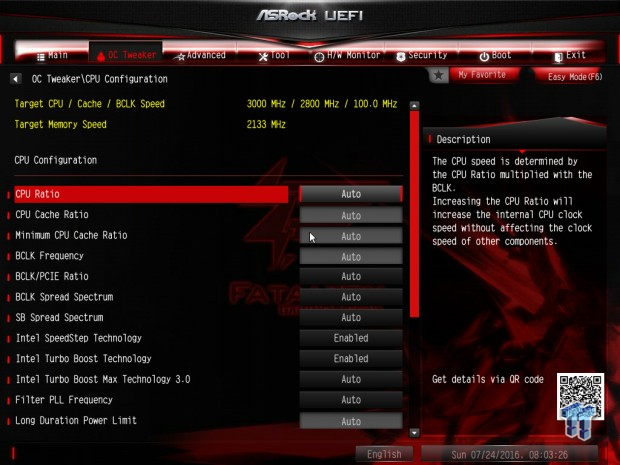
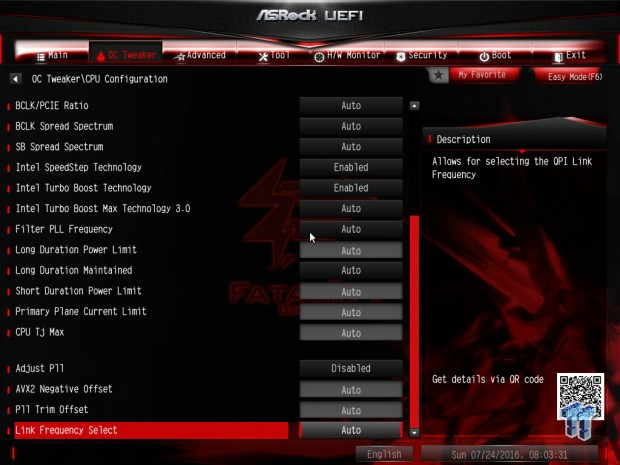
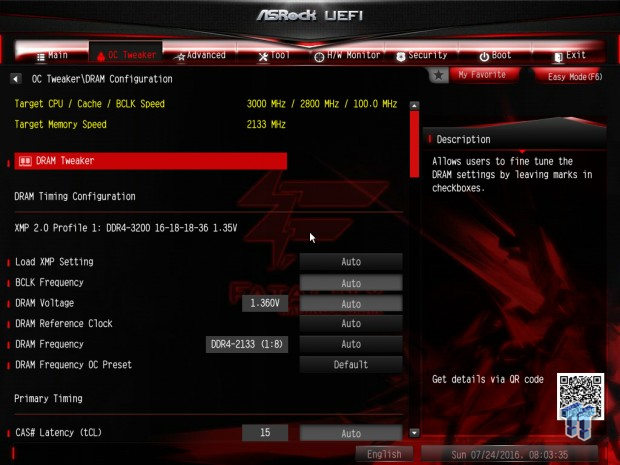
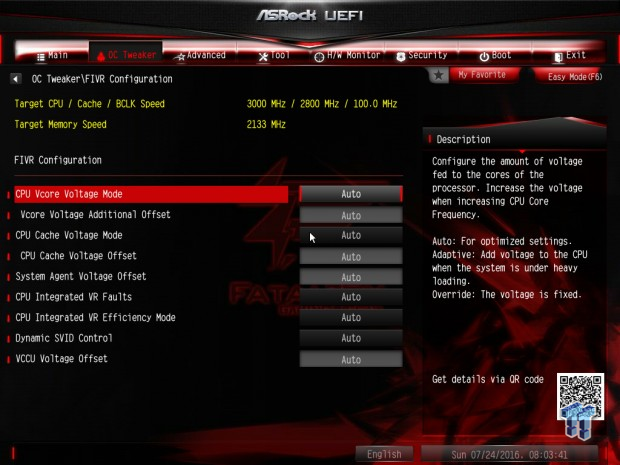
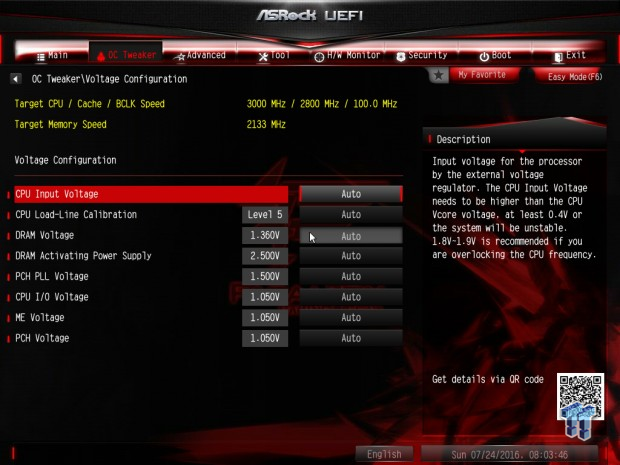
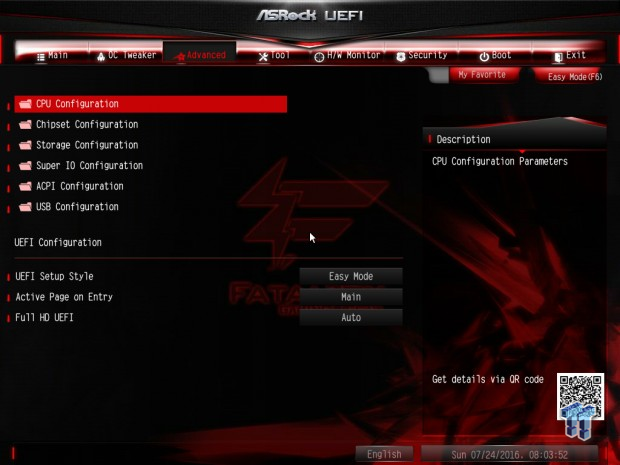
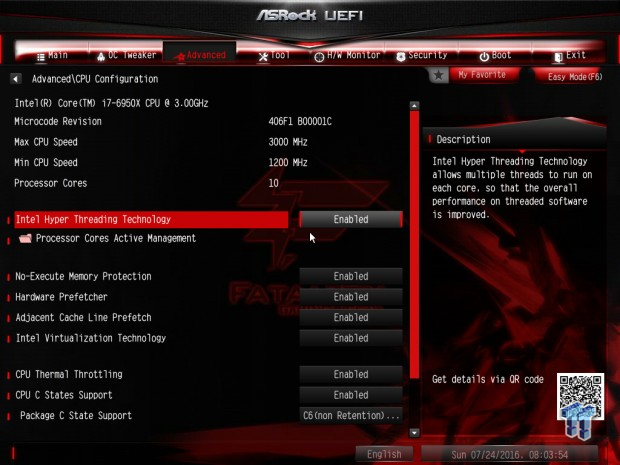
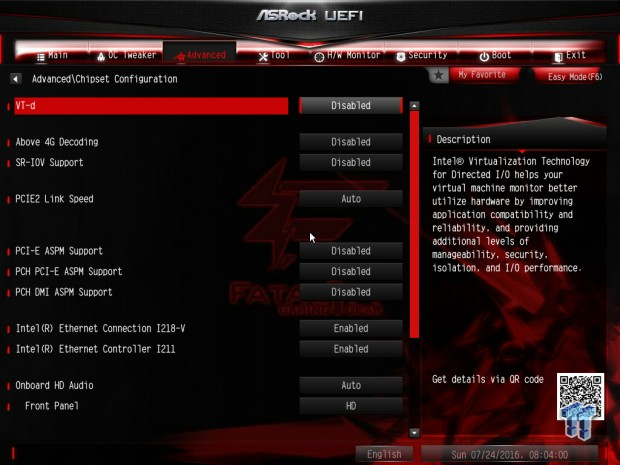
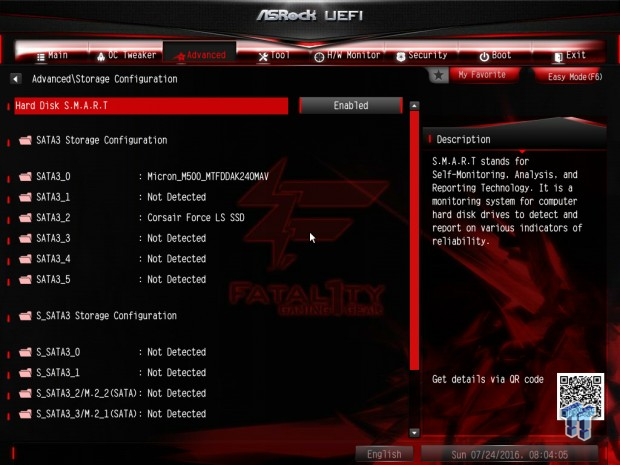
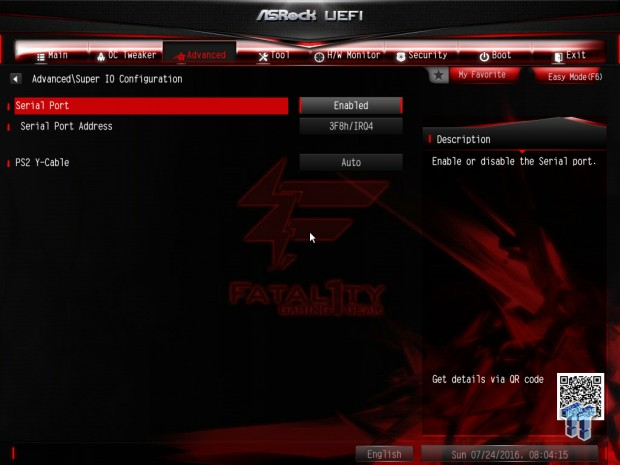
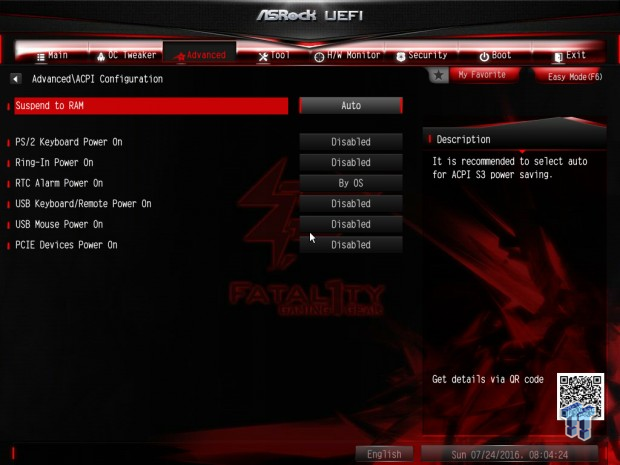
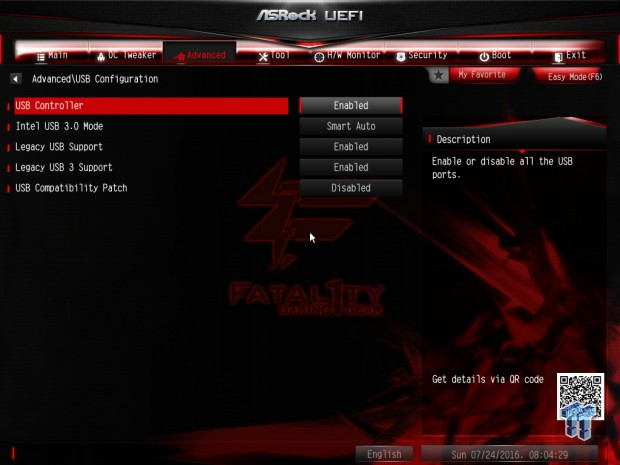
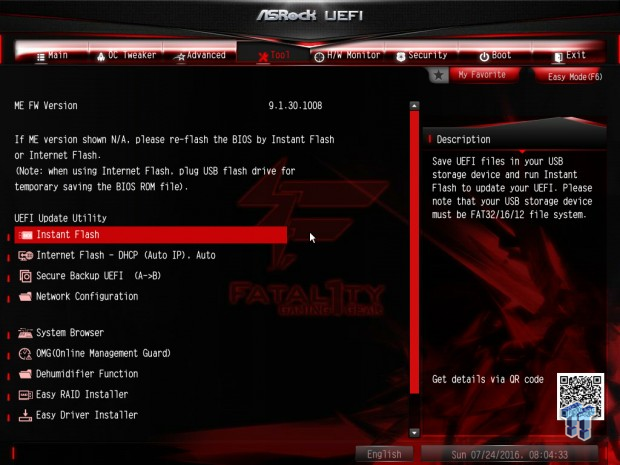
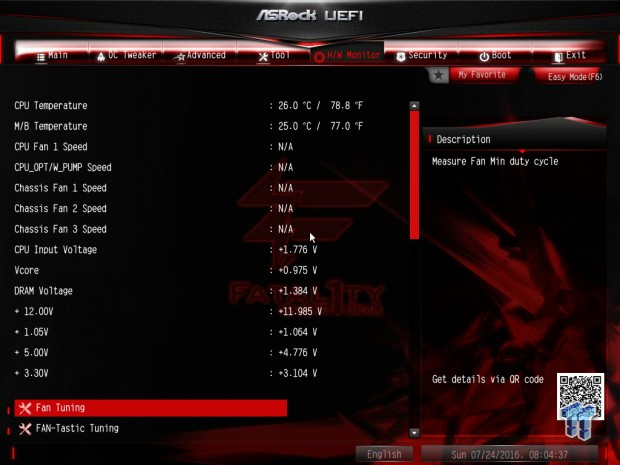
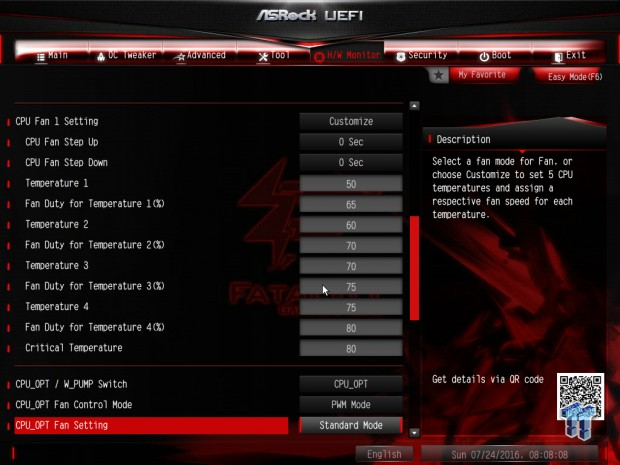
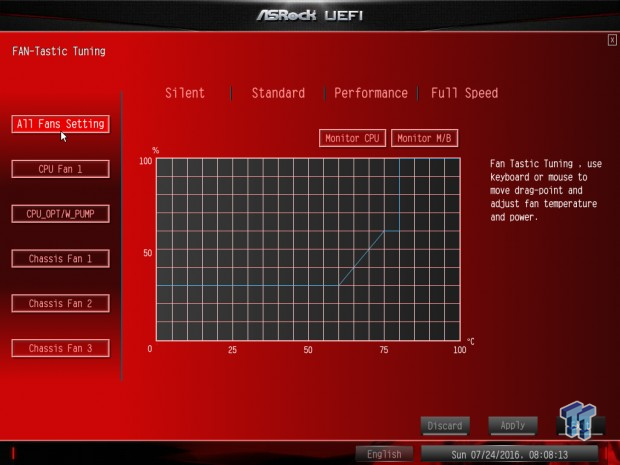
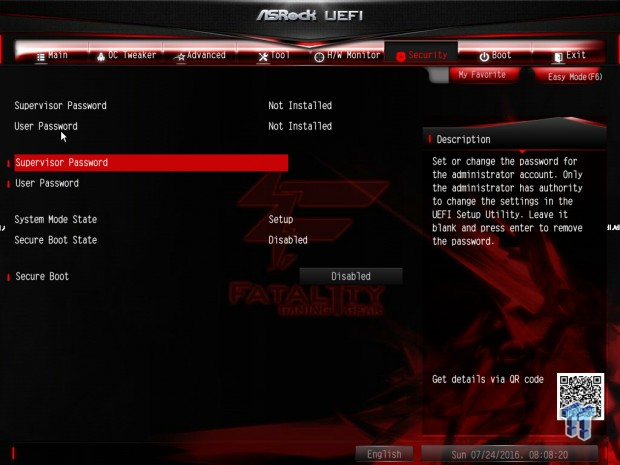
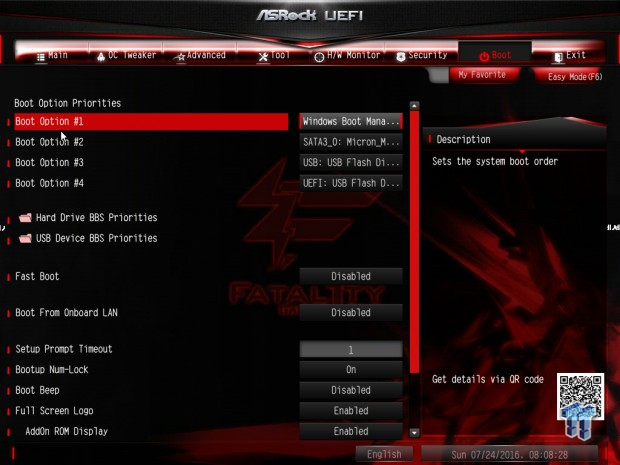
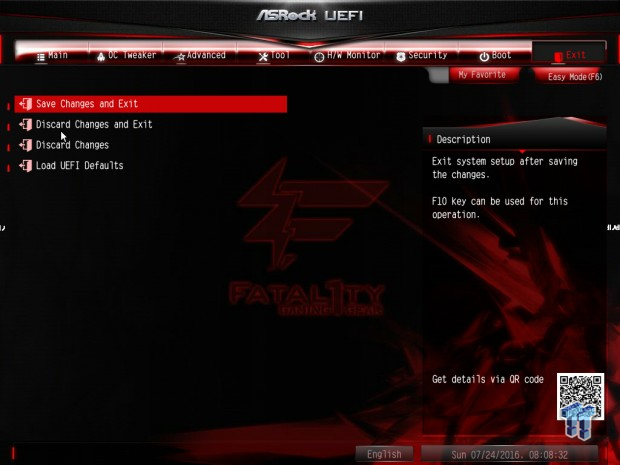
Software
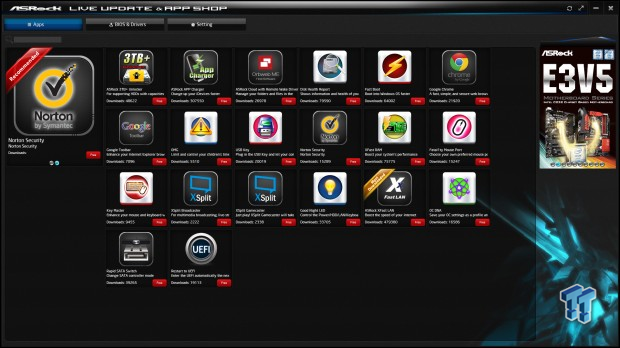
ASRock's APP Shop application allows you to download and install almost all of ASRock's applications including 3TB+, F-Tuning, XFast LAN (cFOS), Restart to UEFI, Rapid SATA Switch, OC DNA, Good Night LED, Key Master, USB Key, OMG, XFast RAM, and a plethora of other ASRock and non-ASRock applications.
Test System Setup
Steven's Motherboard Test System Specifications
- Motherboard: ASRock Fatal1ty X99 Professional Gaming i7
- CPU: Intel Core i7 6950X
- Cooler: Corsair H115i GT - Buy from Amazon
- Memory: Corsair Dominator Platinum (4x8GB) 3200MHz
- Video Card: NVIDIA GeForce GTX 980 - Buy from Amazon / Read our review
- Storage - Boot Drive: Samsung 850 Pro 512GB - Buy from Amazon / Read our review
- Storage - SATA6G Drive: Corsair Force LS 240GB - Buy from Amazon / Read our review
- Storage - M.2 Drive: Samsung XP941 256GB
- Storage - USB Drive: Corsair Voyager GS 64GB - Buy from Amazon / Read our review
- Case: Corsair Obsidian 900D - Buy from Amazon / Read our review
- Power Supply: Corsair AX1200i - Buy from Amazon / Read our review
- OS: Microsoft Windows 10
- Monitor: ASUS PA328 ProArt 32" 4K
- Keyboard: Corsair K70 LUX
- Mouse: Corsair M65 PRO RGB
- Headset: Corsair VOID RGB Wireless
- BIOS: L1.1
- Drivers: Intel INF: 10.1.2.19, Intel ME: 11.0.4.1186, Intel LAN: 20.7, NVIDIA Graphics: 353.82, Audio: V7836
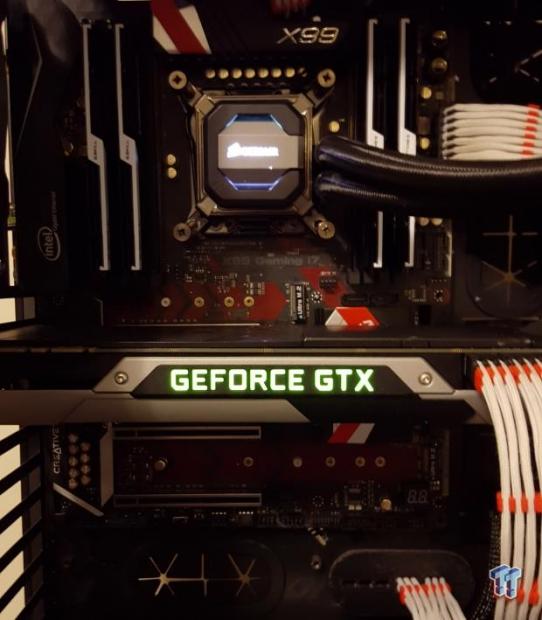
The motherboard doesn't have much regarding active lighting to improve aesthetics, but it should look good in a red themed build.
The new test bench is designed to test every aspect of the motherboard and IO. I have designed it so that the motherboard sits in a case and is cooled by fans always on at a constant rate to keep the conditions similar during all tests. I have cut out part of the case behind the motherboard so I can get thermal images of the back of the PCB where the VRM heat spreads. System and CPU power measurements are now digitally logged.
I am also using a Netgear Nighthawk X4 AC2350 for our network (including wireless AC) tests. The latest M.2, SSD, and USB technologies are also being utilized to test the maximum potential of the motherboards that are tested.
Overclocking
Overclocking Results
CPU Overclocking
If you hadn't already heard, the 6950X 10-core $1700 beast isn't the best overclocker. I cannot validate CPU frequency anywhere near 5GHz, and I cannot even boot at 4.5GHz, but I can run 4.4GHz on all cores. I have decided to change how I do the overclocking section and determine exactly what it takes to push to the CPU to this maximum stable frequency on the different motherboards I test.
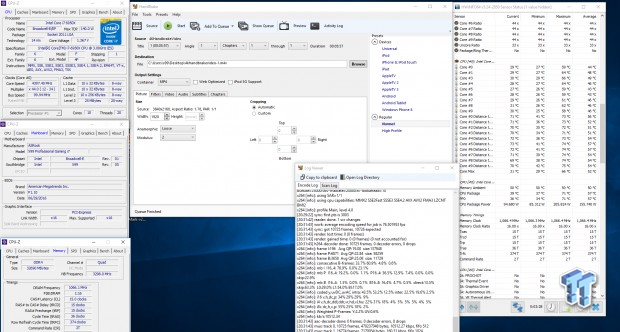
ASRock's Fatal1ty X99 Professional Gaming i7 is a decent overclocker, but I did have to fiddle with voltages to get the 4.4GHz stable. Memory overclocking was easy, and I didn't encounter much resistance to using XMP.
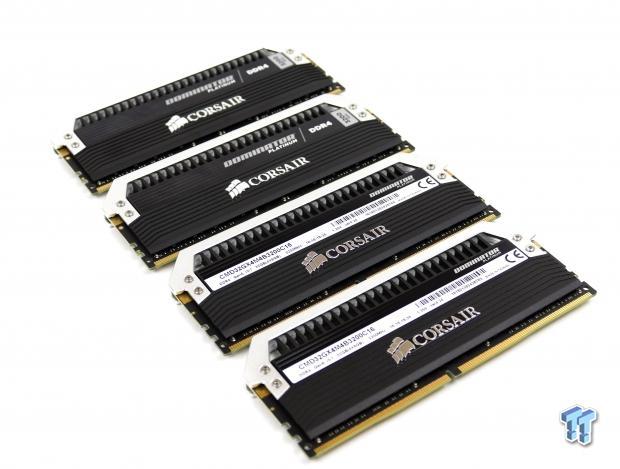
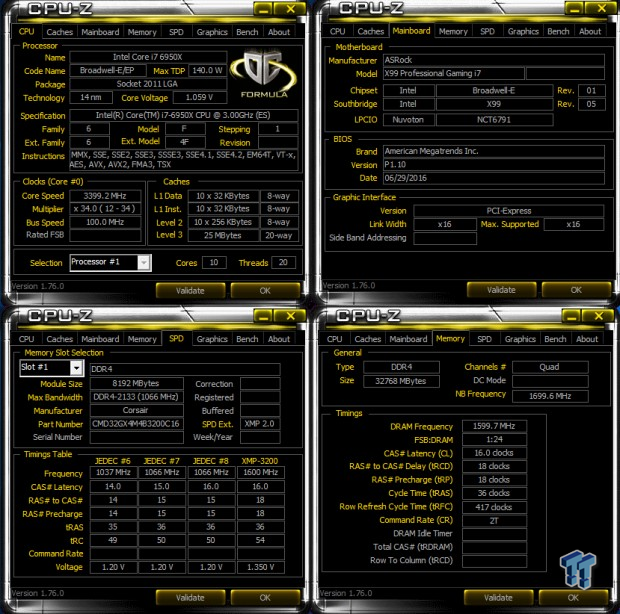
The Dominator Platinum 32GB 3200MHz C16 kit is working well.
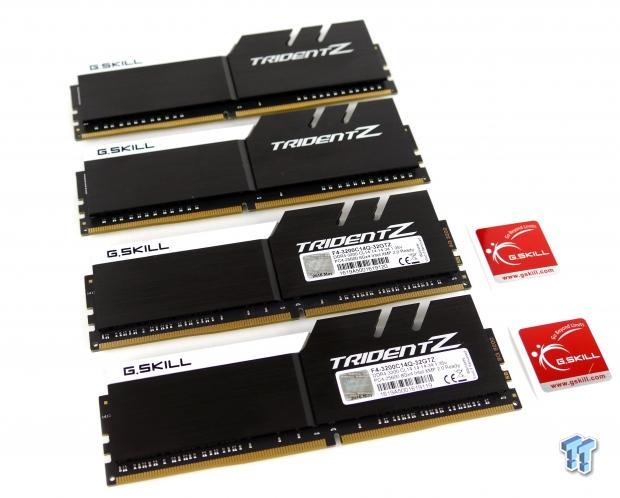
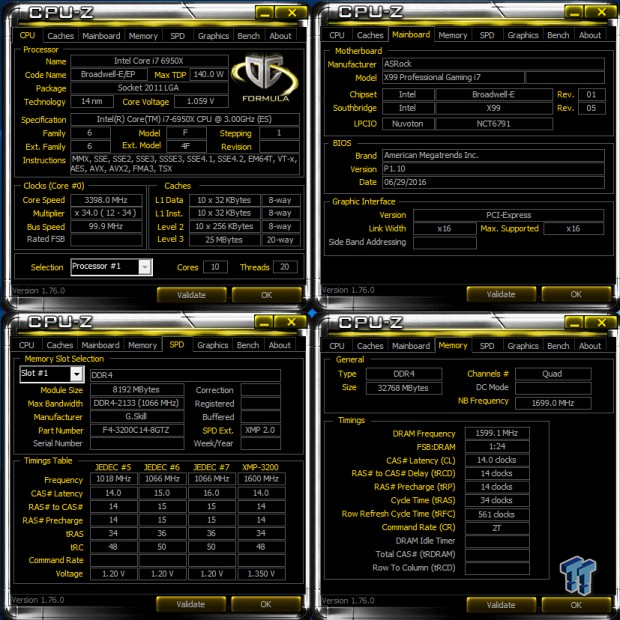
The G.Skill TridentZ 32GB 3200MHz C14 kit is also working well.
CPU, Memory, and System Benchmarks
CINEBENCH 11.5
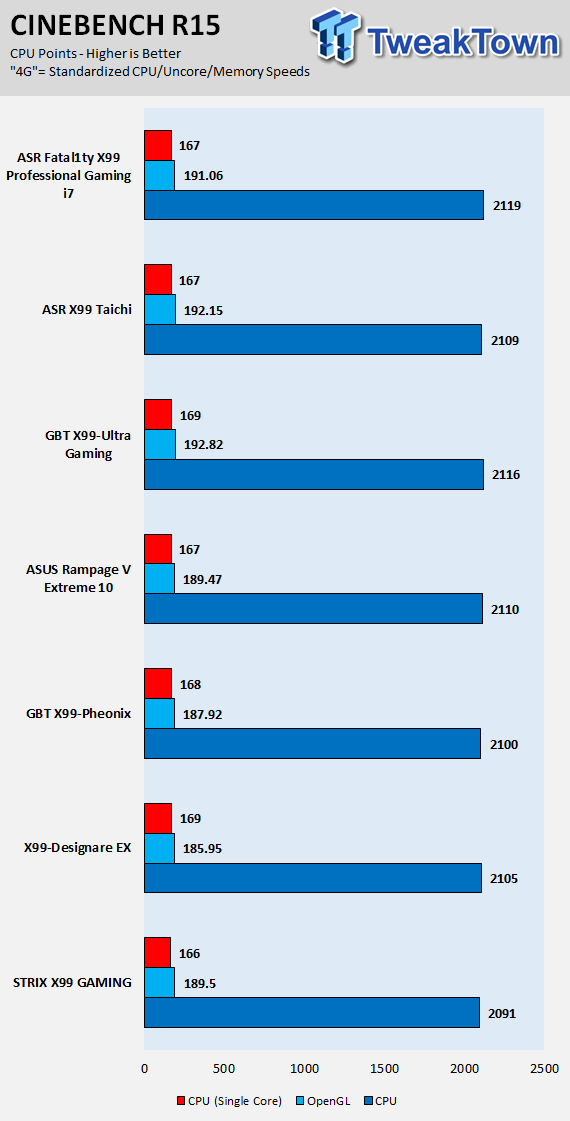
wPrime
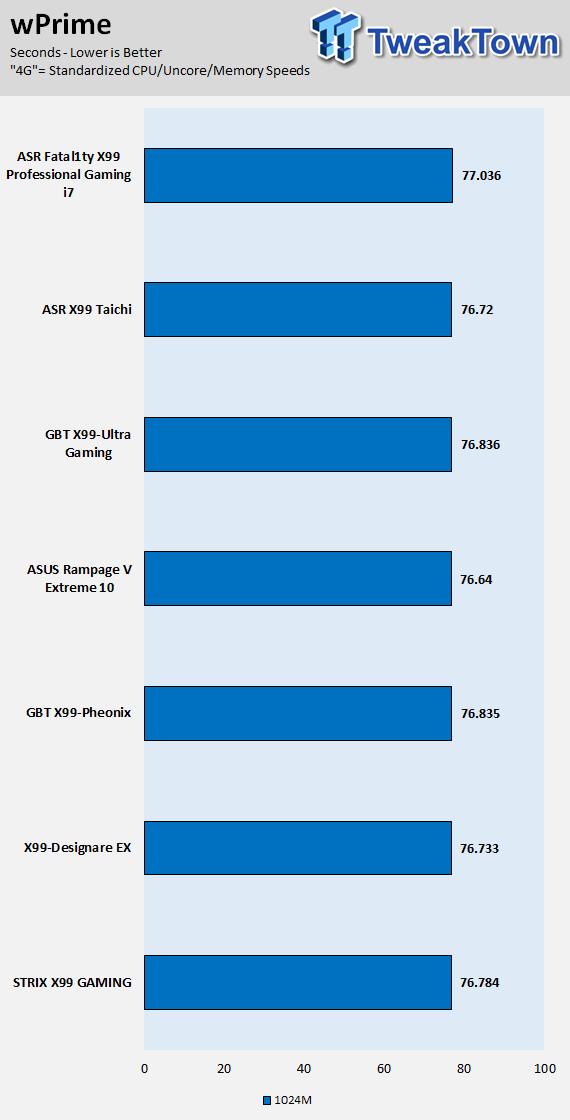
AIDA64 AES and HASH
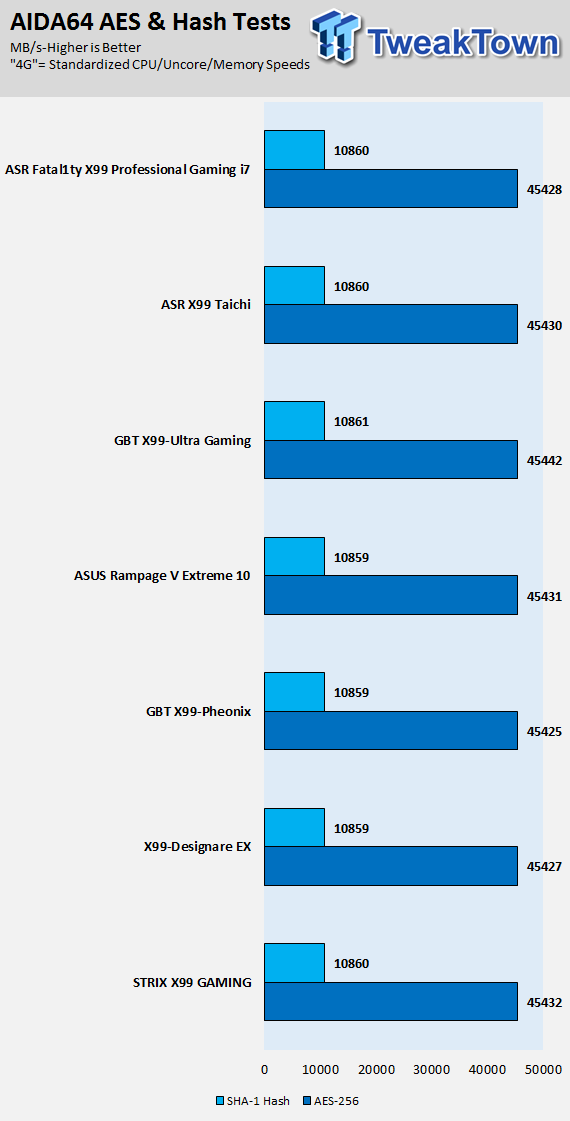
AIDA64 FPU
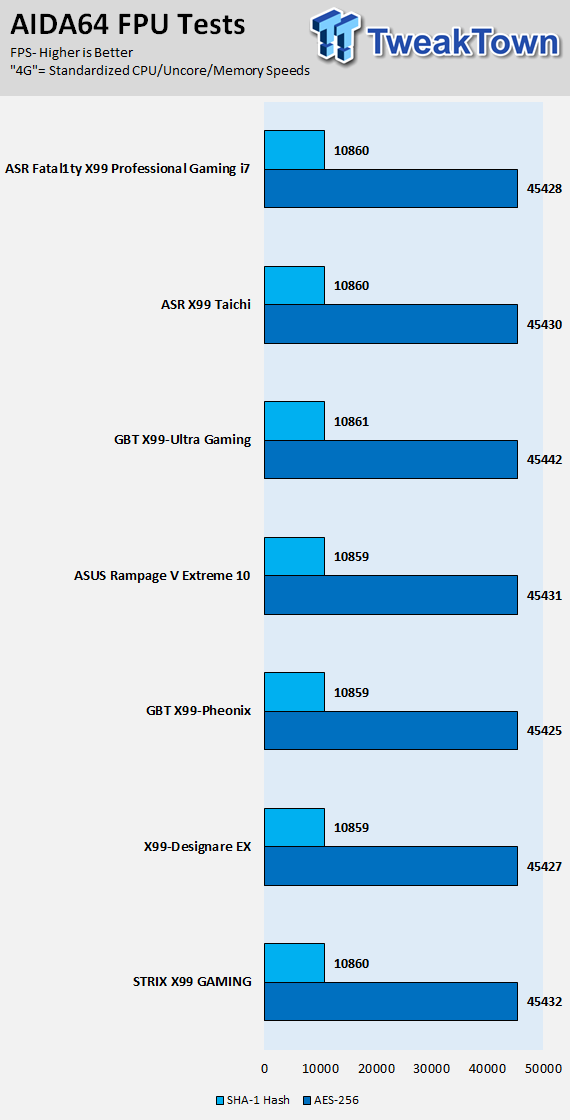
AIDA64 Memory
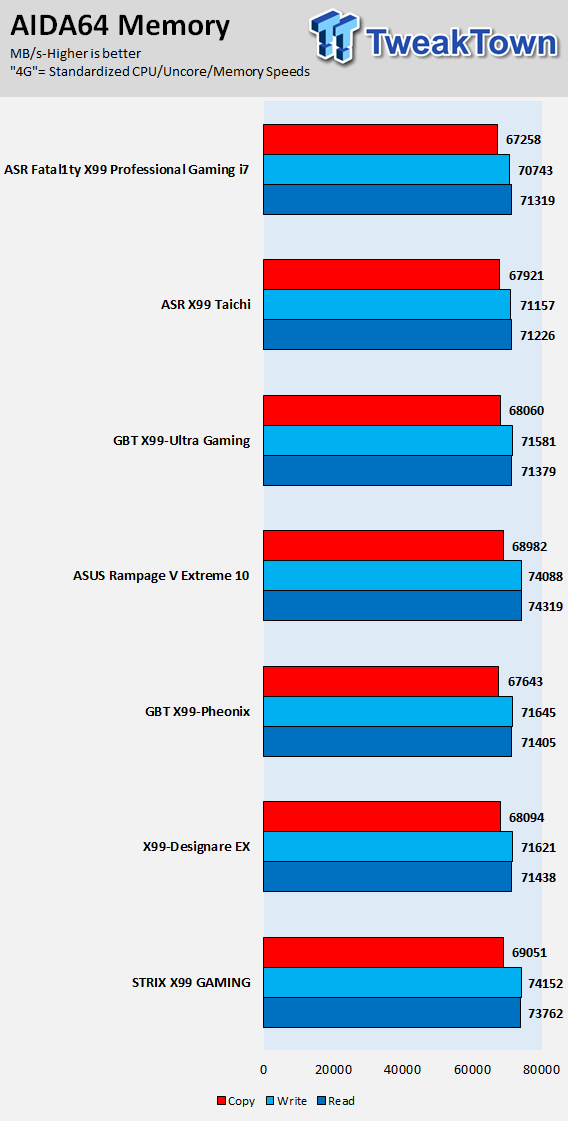
ScienceMark
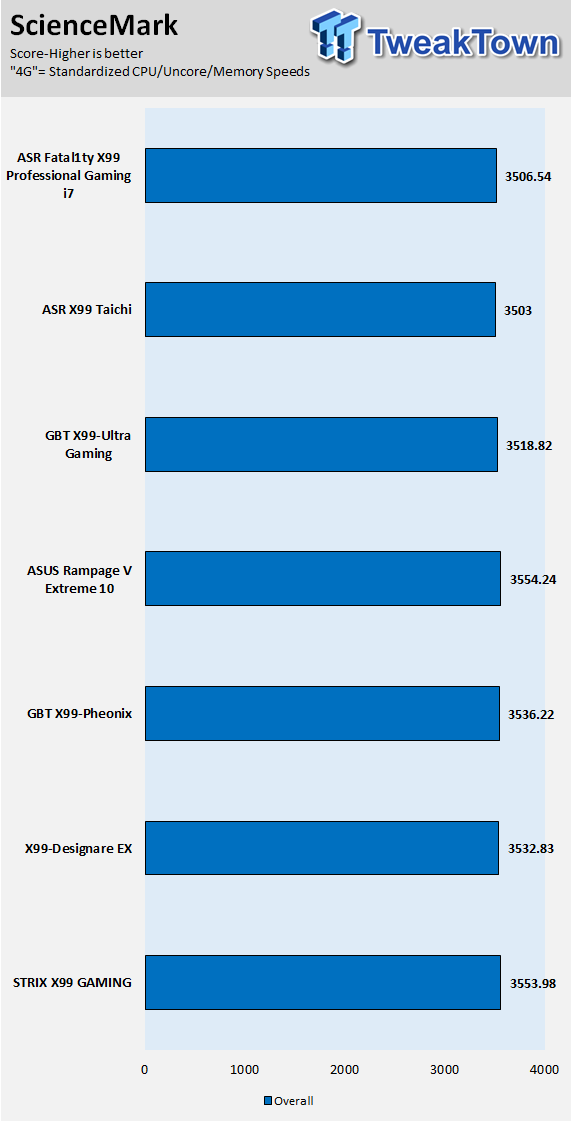
HandBrake 4K
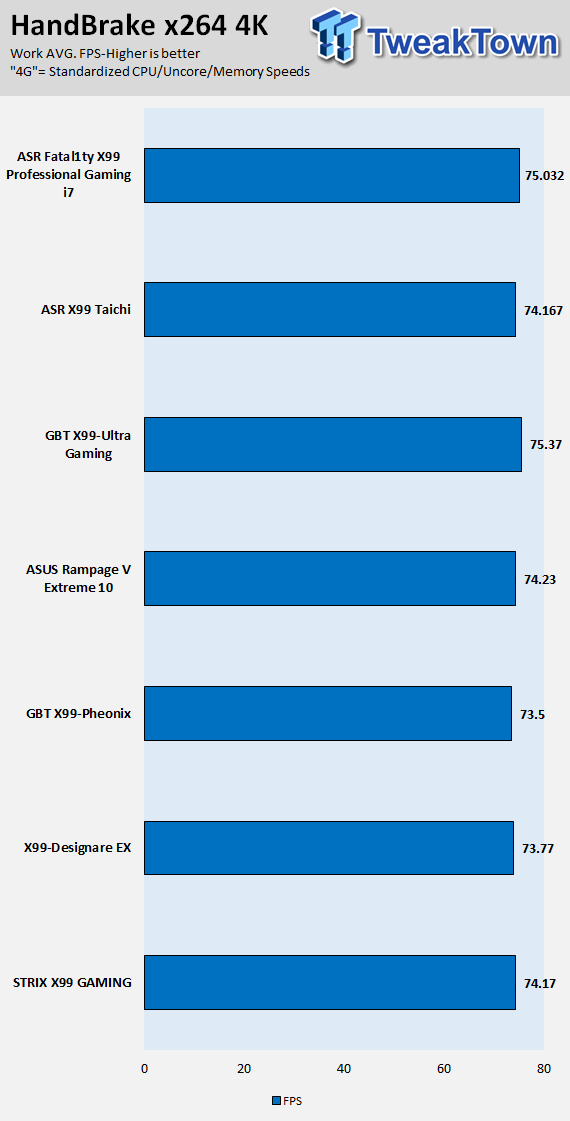
3DMark: Cloud Gate
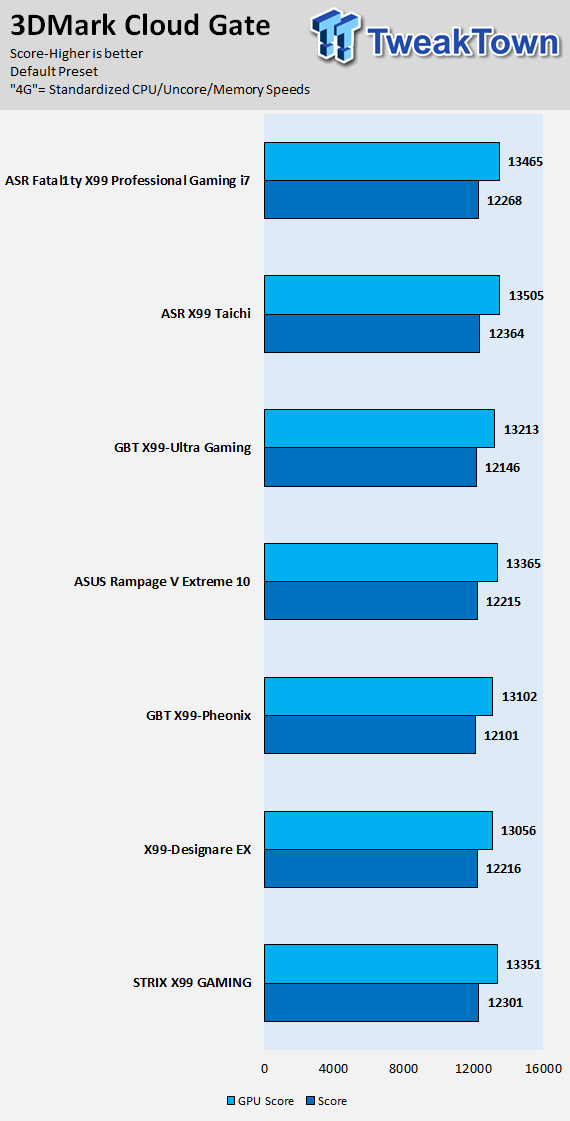
3DMark: Fire Strike
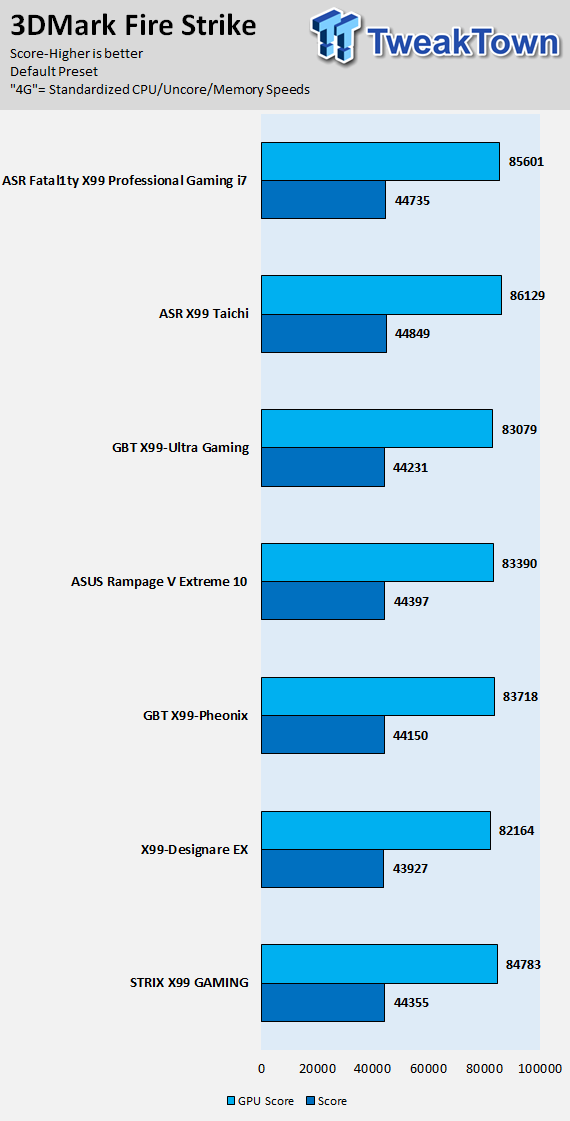
ResidentEvil 6
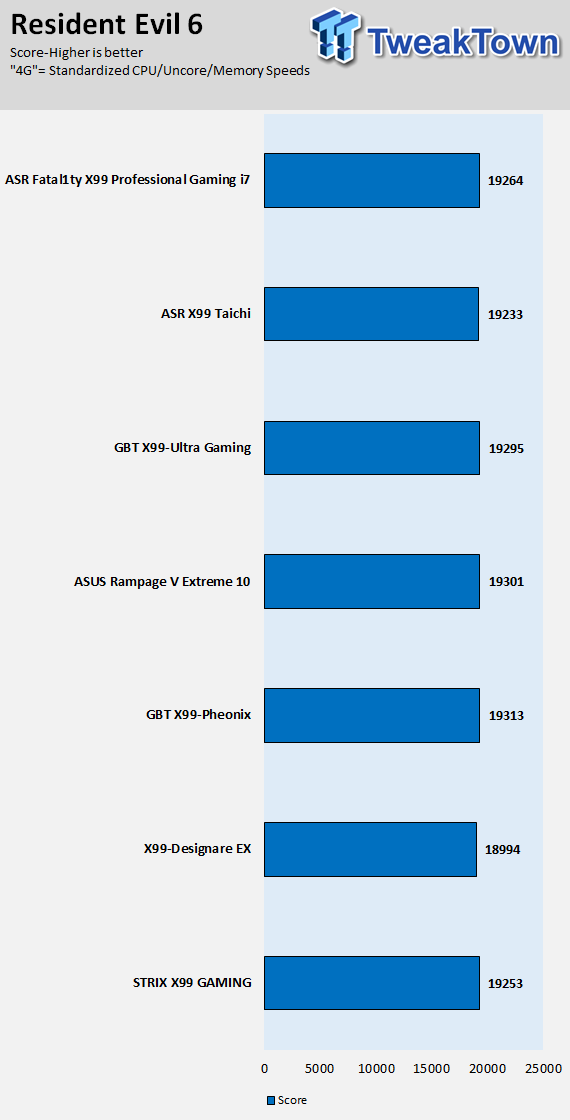
I have decided to test motherboard performance based upon a standardized 4GHz profile for the new X99 refresh motherboards. The base frequency of the 6950X is 3GHz, but since Intel's Turbo profile allows for a single core to hit 4GHz, some motherboards will take any number (sometimes all) of the cores to 4GHz at stock settings, and this creates a huge performance disparity at stock. In all these tests I ran the CPU at 4GHz on all cores, the cache at 3.5GHz, and memory at 2666MHz with timings 16-18-18-36 T2, and allowed the motherboard to set the rest of the timings itself.
The Fatal1ty X99 Professional Gaming i7's scores are very close to that of the X99 Taichi. I expected that since they are quite similar. All scores are within the margin of error of the individual benchmarks (you almost never get the same score twice), and I found no performance pitfalls.
Overall, performance is strong.
System IO Benchmarks
SATA6G:
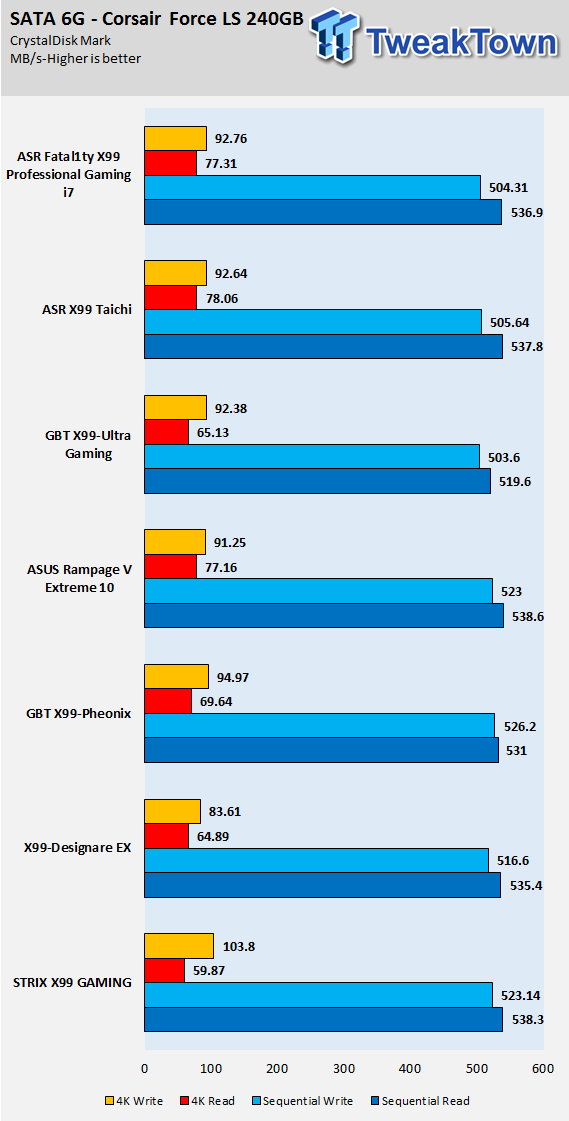
M.2:
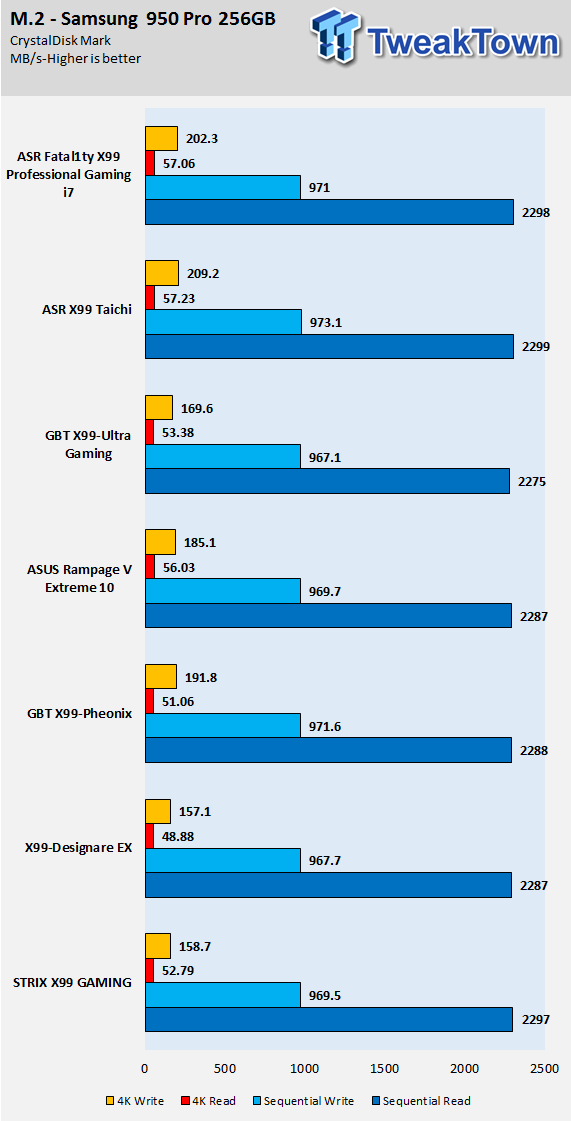
ixChariot Network Throughput:
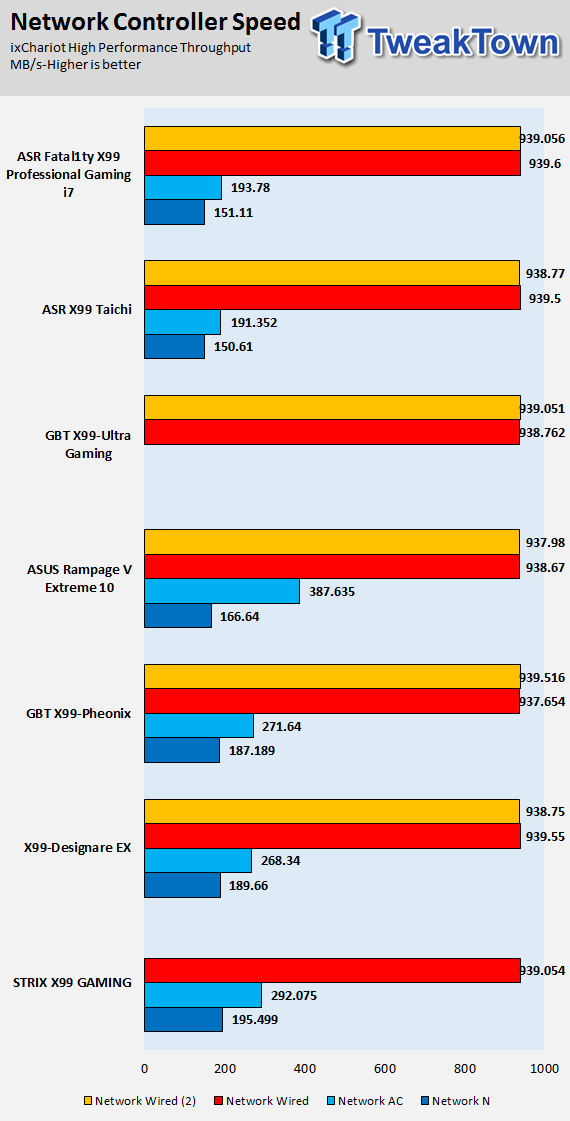
The Fatal1ty X99 Professional Gaming i7's IO performance is quite strong, just like most of the other ASRock motherboards.
Audio RMAA 5.5:
I disable all audio features, set the correct bitrates, and then test the audio with a loopback test.
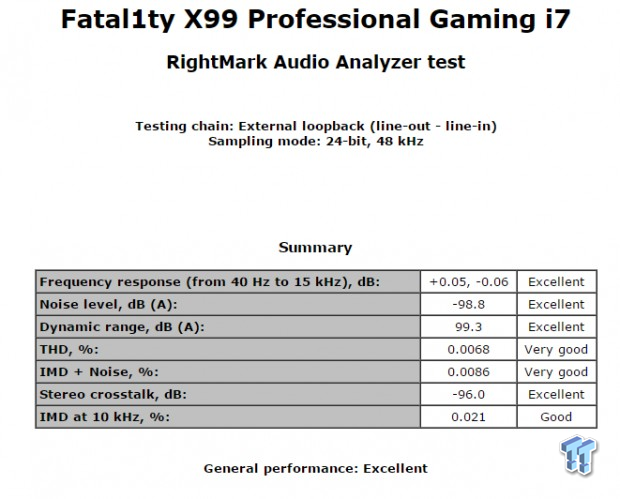
Sound Judgment by Ear: Very Good. There are five ratings for audio: 1. Problems, 2. Okay, 3. Acceptable, 4. Very good, 5. Excellent
Thermal Imaging and Power Consumption
CPU power is measured through the 8-pin connector, which is hooked up to a hall effect IC, which measures current and puts out a voltage in proportion to the current. That voltage is logged by a National Instruments ADC, which logs the DC voltage level that I then convert into current.
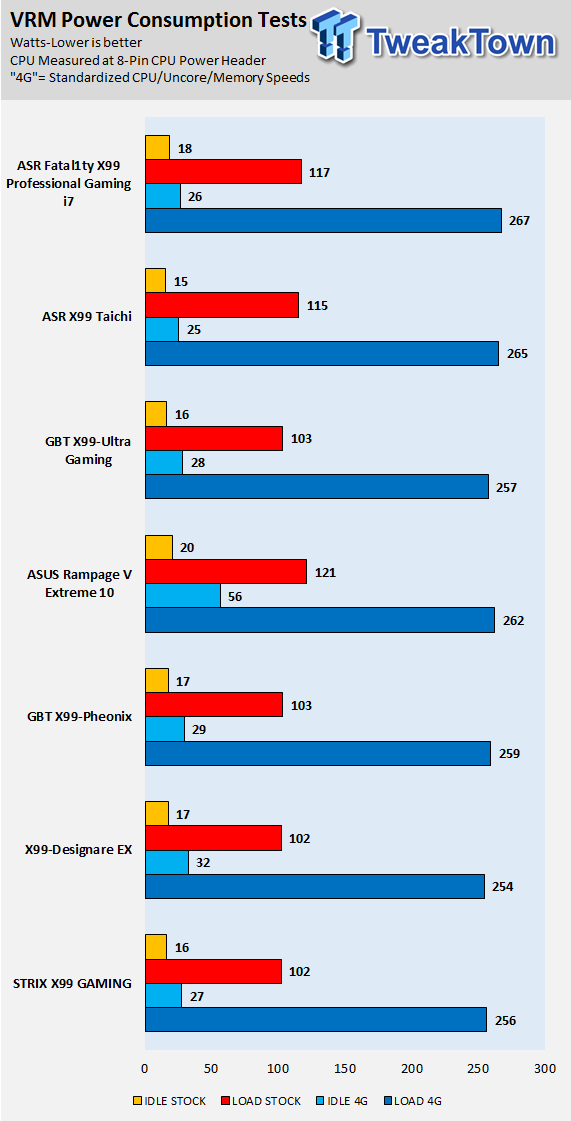
Note on Thermal Images: In the temperature section, we use our Seek thermal imaging camera to capture the surface temperatures of major components on the board. I look at the VRM and then all other things that light up the screen. If there is something to worry about, then I will state it. Otherwise, I will just show the hotter running parts of the board for fun. Unless some component is over 80-90C, then there isn't anything to worry about.
All systems will act differently, so I will look for commonalities, such as how far from the VRM the heat spreads through the PCB and the difference in temperature between the front side and backside of the PCB. Keep in mind, the majority of the heat from the VRM goes into the PCB as it is a giant soldered on copper heat sink. A larger difference in temperature between the back and front of the PCB points towards a more effective heat sink.
Thermal Testing at Stock Speeds:
The image on the left is always at idle, and the image on the right is at load. During ALL TESTS, fans above the VRM that cool the CPU cooler's (Corsair H110i GT) radiator are turned on to high (12v).
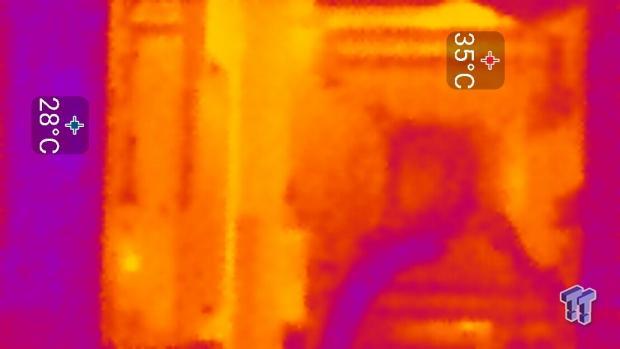
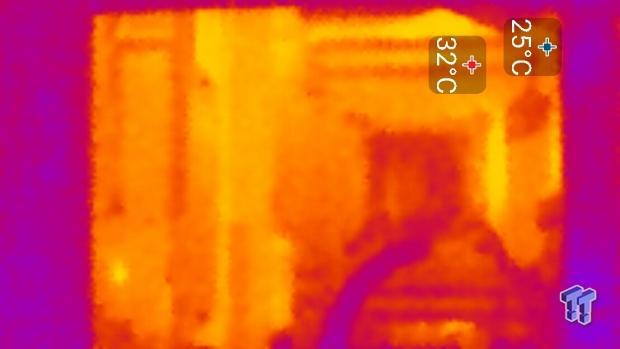
Full frontal.
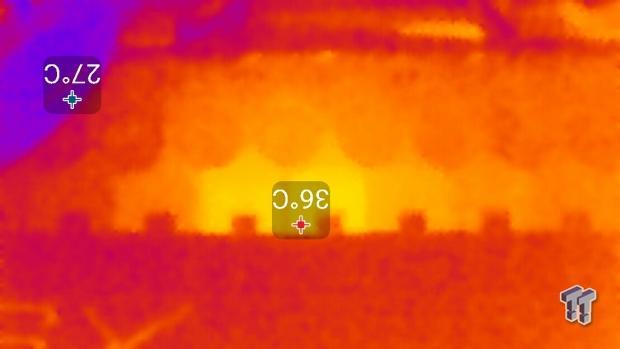
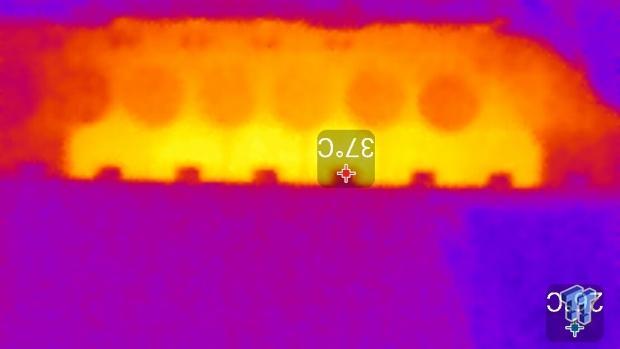
Up-close of the front of the VRM.
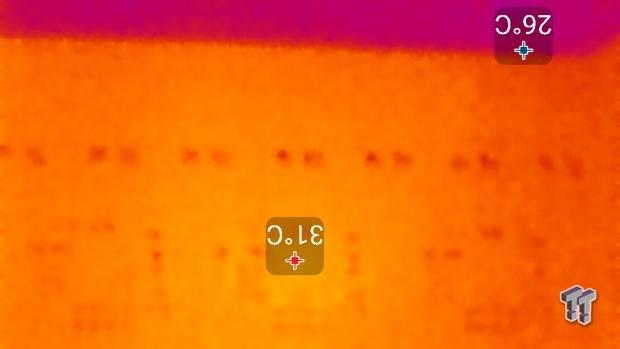
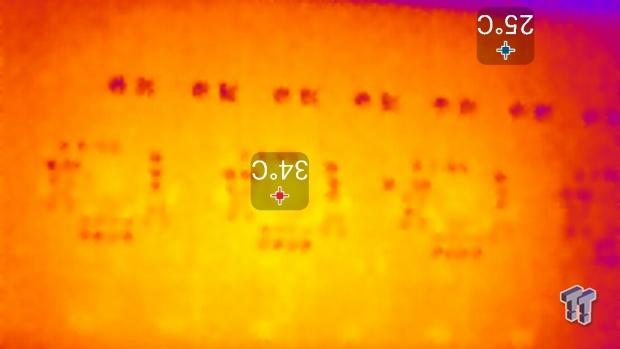
Up-close of the back of the VRM.
Thermal Testing at 4.5GHz Overclocked Speeds:
The image on the left is always at idle, and the image on the right is at load. During ALL TESTS, fans above the VRM that cool the CPU cooler's (Corsair H110i GT) radiator are turned on to high (12v).
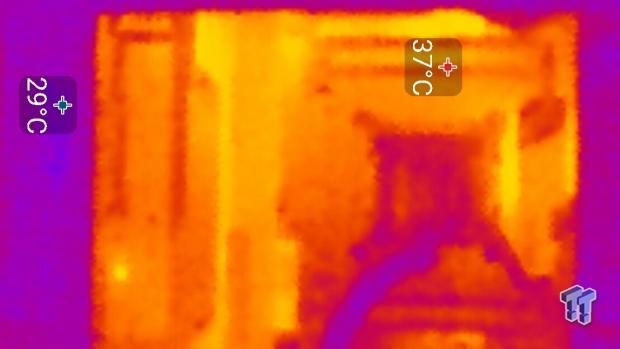
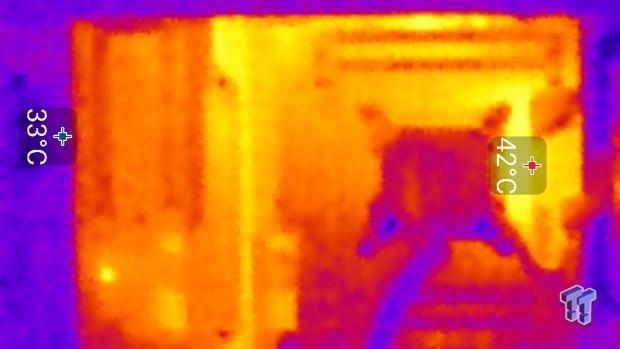
Full frontal.
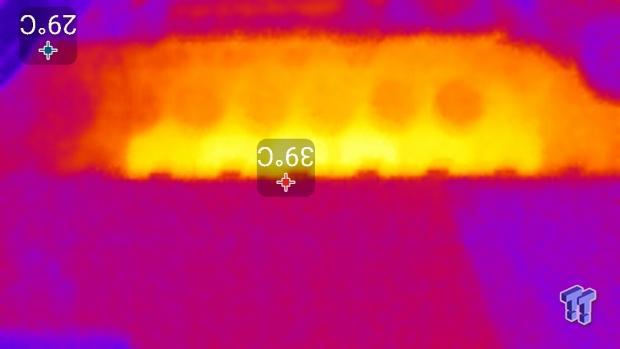
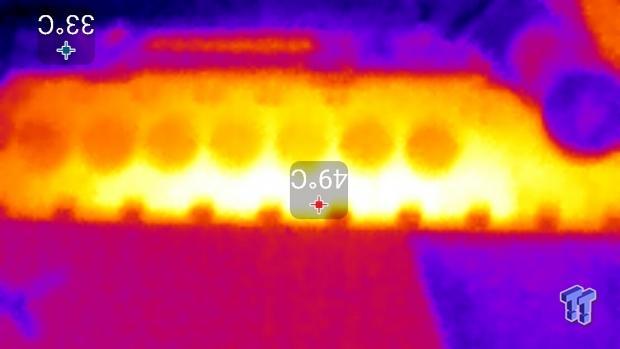
Up-close of the front of the VRM.


Up-close of the back of the VRM.
The VRM on the Fatal1ty X99 Professional Gaming i7 is overbuilt, which is great for overclocking. The hybrid digital PWM does very well with phase shedding in light load situations and shifts to utilizing all phases when under a heavy load. Overall VRM performance is great, and the heat sink does a decent job of cooling the VRM.
Anything under 60C is great, 60-80C is acceptable, and anything above 80C is a bit worrisome (if at stock).
What's Hot, What's Not & Final Thoughts
Here are key points about the ASRock Fatal1ty X99 Professional Gaming i7.
What's Hot
Strong VRM: The VRM of the Fatal1ty X99 Professional Gaming i7 is very strong and will allow you to overclock your power hungry Haswell-E or Broadwell-E processor as far as it will go.
Dual M.2 Slots: Since most of the newer high-performance drives coming out are based on x4 PCI-E 3.0 M.2, it makes sense for many to have two M.2 slots rather than one M.2 slot and a U.2 port. The slots support up to 32Gb/s of bandwidth each, and ASRock made sure to also include an SATA link so that you can use SATA based M.2 drives in them instead of PCI-E drives.
Great 2-Way Multi-GPU Spacing with 40-Lane CPUs: With a 40-lane CPU, you get excellent spacing for two GPUs running at x16 each.
Dual Intel NICs: Many users covet Intel networking controllers, and for those people, ASRock has delivered.
OC Features: I was happy to find a POST code display and other OC features such as a BIOS selector switch and UEFI overclocking profiles.
What's Not
Need to use rear USB 2.0 for USB OS Installation: On page 9 of the manual, there is a small notification letting users know they have to use the USB 2.0 ports on the IO panel if they want to install an OS with a USB drive. USB 2.0 is of course much slower than USB 3.0, but hopefully you aren't installing an OS that often.
3-Way PCI-E Spacing: 3-way SLI/CrossFireX is possible with both 40 and 28 lane CPUs, but putting a card in the last slot will cover up many of the headers at the bottom of the motherboard.
WIFI is Not the Fastest: While the Fatal1ty X99 Professional Gaming i7 does have wireless AC, it's not the fastest out there. In fact, I wasn't able to get it to perform much better than most wireless N controllers.
Final Thoughts
The Fatal1ty X99 Professional Gaming i7 is a stronger X99 Taichi, with more mainstream gaming looks and even features. While the Taichi is great value for its price, the X99 Professional Gaming i7 might seem a little overpriced considering the limited nature of the upgrades. Of course, you will get OC features and some extra connectivity with the Fatal1ty X99 Gaming Professional i7. The Fatal1ty X99 Gaming Professional i7 is a solid motherboard; it has a ton of great features, solid performance, and great red and black aesthetics.
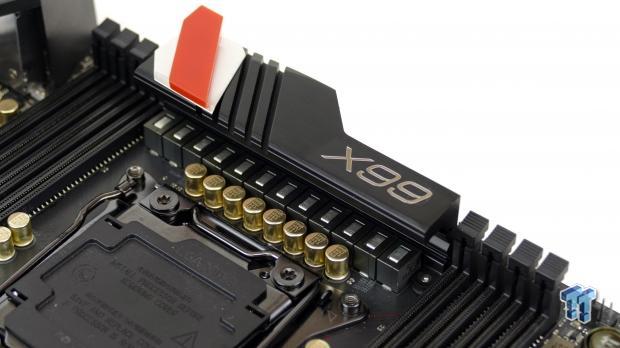
At right above $250, it's a great motherboard for someone looking to buy a feature-rich product with a lot of value. I was surprised that ASRock did not use any LEDs to spruce up the motherboard, but considering the price, I am happy they decided to forgo the LEDs. If you aren't impressed with the X99 Taichi and want something a little better and more robust, give the Fatal1ty X99 Professional Gaming i7 a look.

